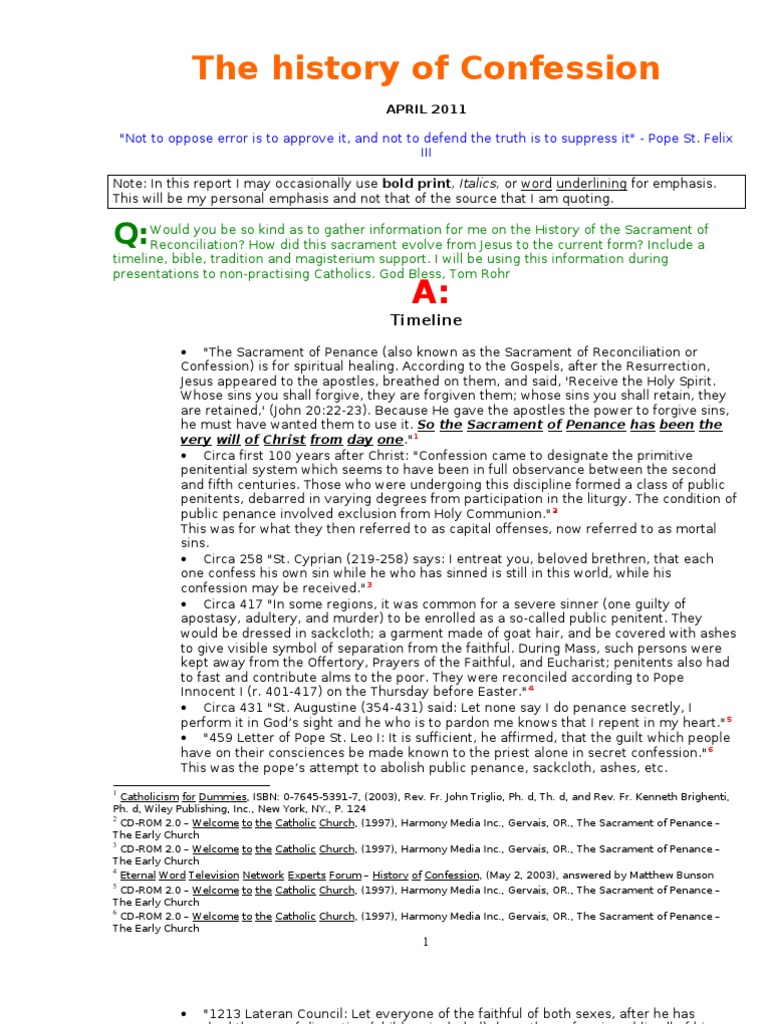The sacrament of reconciliation, commonly known as confession, holds a profound place within the Catholic tradition, weaving through the fabric of Christian life with its rich symbolism and theological significance. For many believers, the act of confession evokes an ambivalent mixture of solemnity and relief, inciting a deep exploration into the nature of sin, forgiveness, and personal transformation. This exploration exposes the dichotomy of human existence—sinfulness and the yearning for redemption—reflecting an intrinsic struggle as old as humanity itself.
At its essence, Catholic reconciliation is an encounter between the penitent and God, facilitated through the priest. The sacrament is grounded in the belief that Christ instituted reconciliation as a means of grace for the faithful. The Gospel narratives abound with instances where Jesus extends forgiveness to sinners, illustrating the divine nature of mercy. He invites individuals to acknowledge their transgressions, engendering a culture of humility and accountability.
The sacramental process typically involves several components: contrition, confession, satisfaction, and absolution. This multifaceted approach allows individuals to confront their spiritual malfeasance profoundly. Contrition, the most critical step, requires genuine sorrow for one’s sins, a heartfelt remorse that transcends mere regret. It aligns the individual’s spirit with an authentic desire for reconciliation with both God and the community.
Interestingly, the act of confessing one’s sins—speaking them aloud to a priest—serves as both catharsis and confrontation. It necessitates vulnerability, demanding that the penitent articulates concealed shame and guilt. This verbalization can lead to a transformative realization of one’s flawed human condition, fostering a way to reconcile not only with God but also with one’s self-perception.
However, many find the notion of confession daunting. The fear of judgment or the weight of disclosing deeply buried sins can overshadow the profound spiritual benefits. This unease highlights a common observation within the contemporary context: the increasing individualism within society engenders a reluctance to confront external authority, including spiritual leaders. In the solitude of one’s interior life, the confrontation of sin can become an isolating endeavor. Yet, this isolation fails to account for the communal aspect of faith. The sacrament emphasizes the belief that sin affects not just the individual but the entire Church—the body of Christ—implying that reconciliation transcends the individual experience.
Furthermore, the sacrament embodies the paradox of human freedom. On one side, sin leads to alienation; it shackles individuals in guilt and despair. On the other, the sacrament of reconciliation offers the pivotal choice to seek release from these chains, showcasing a path toward spiritual liberation. This duality of bondage and freedom resonates deeply within the Christian moral framework, presenting a compelling argument for the necessity of accountability.
The theological understanding of grace amplifies the significance of reconciliation. Grace serves as the divine gift that facilitates the penitent’s return to righteousness, illuminating the path toward moral rectitude. The Holy Spirit plays an active role in this transformation, enabling individuals to accept God’s forgiveness and instigating a metamorphosis that cultivates a renewed spirit. The experience of grace is often ineffable, a divine reassurance that allows one to transcend the weight of sin.
Moreover, the ritualistic aspect of confession, with its prescribed prayers and gestures, imbues the process with an air of solemnity and reverence. It acts as a formal acknowledgment of one’s deficiencies and as a recognition of the need for divine assistance. Each act of penance, whether it be a prayer, task, or act of charity, further reinforces the accountability to the community, emphasizing the Martinian belief in the importance of restoring relationships not only with God but with one’s neighbors.
One cannot overlook the historical evolution of reconciliation within the Church. From its nascent stages as an act of public penance to its contemporary, more personal manifestation, confession has experienced great transformations, yet its essence remains grounded. The Church’s teachings elucidate the gravity of sin while simultaneously upholding the hope found in absolution. This historical context forms a richer understanding of modern practices and can alleviate some of the fears surrounding the sacrament, showcasing its deep roots in Christian tradition.
Furthermore, engaging in confession opens up conversations about forgiveness, both sought and given. It encourages reflection on how individuals forgive others, which, in many instances, may reflect their own experiences of forgiveness received from God. The relational dynamics between God and humanity, and among people, mirror one another; hence, the act of receiving forgiveness catalyzes a deeper understanding of what it means to offer it. Indeed, the cyclical nature of reconciliation and forgiveness fosters an atmosphere that not only heals individuals but nurtures the broader Church community.
As such, Catholic reconciliation stands as a profound testament to the enduring quest for spiritual wholeness. It connects the temporal with the divine, offering believers a tangible means of confronting their moral failings and catalyzing renewal. In navigating the complexities of sin, confession, and forgiveness, participants partake in a sacred journey—a yearning for reconciliation with God, self, and community that holds immense promise for spiritual growth and transformation.
In conclusion, the sacrament of reconciliation presents a multifaceted exploration of the human condition, inviting individuals to undertake a sincere self-examination. The experience is not merely about acknowledging sin but rather embarking on a divine journey of redemption, grace, and relational restoration. Ultimately, reconciliation is both a personal and communal endeavor that mirrors the boundless love and mercy of Christ, reinforcing faith and fostering an ever-deepening relationship with the divine.



